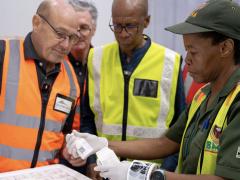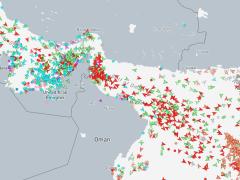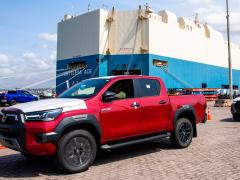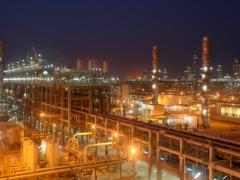Delaying the privatisation of South African ports “will only delay sure economic benefits”, says Chris Knoetze, managing director of Link Supply Chain Management, a major player in the fresh fruit export industry.
According to Danica Potgieter, logistics coordinator at Link Supply Chain Management, privatisation has redefined port operations across Africa.
“Major hubs like Tema (Ghana), Abidjan (Côte d’Ivoire), Tanger Med (Morocco) and Lomé (Togo) transitioned from slow, congested state-run systems into globally competitive trade engines shortly after privatisation.
“Meanwhile, South African ports like Durban and Cape Town continue to struggle with delays, inefficiency and infrastructure bottlenecks – costing the economy and weakening trade competitiveness,” says Potgieter.
Link Supply Chain Management – co-owned by fruit exporters Tru-Cape, Two-a-Day, Ceres Fruit Growers, Dutoit Agri and Mouton Citrus – says its findings, based on a new study commissioned by its shareholders, “underscore the urgent need to privatise the port of Cape Town to unlock similar benefits for the Western Cape economy”.
The study found that most privatised ports operate at 25 to 40 gross crane moves per hour (GCH) while non-privatised ports, like Cape Town, maintain an average of 8-15.2 GCH.
Other advantages include increased investment, dwell time reductions, higher throughput capacity, the ability to accommodate larger vessels and more cargo, and enhanced regional integration, which drive logistics growth across borders.
“Privatisation has also sparked broader benefits such as job creation, improved trade competitiveness and strategic management,” Potgieter says.
“The key drivers of these changes include successful global operators with KPI-driven operations and performance incentives, infrastructure upgrades such as deeper berths and new terminals as well as investments in modern cranes, yard systems and RTGs, and digital cargo tracking and smart port systems.”
Potgieter says African countries take an average of 30 to 50 years to privatise their ports after gaining political independence but, once these ports open to private-sector partners, the transformation is rapid and undeniable.
“More than 30 years after democracy and over 60 years since becoming a republic, South Africa has not yet privatised any of its container terminals. There is no reason to wait as long as other African countries to privatise our ports. The sooner we begin the process, the earlier we can unlock greater efficiency, ease bottlenecks and modernise our port infrastructure. All these aspects will benefit the South African economy and strengthen our global competitiveness.”
The Transnet turnaround strategy was implemented in April last year but fruit industry insiders believe the results thus far fall well short of what is required while private investment in other African ports has yielded sterling results.
Link Supply Chain Management points to Walvis Bay in Namibia, which first discussed privatisation in 2023 and officially began operating under private management earlier this year, and is already expanding its capacity and transshipment flows.
In Togo, privatisation of the port of Lomé has transformed it from a modest regional port to one rivalling Durban in strategic importance.
“Recently, the MSC Diletta, a 24 000 TEU vessel, which is 400m long and 61m wide and one of the world’s largest container ships, docked at Lomé. Lomé has crane productivity of 35 GCH and sufficient support services like tugs and pilots to set this port up as an integrated regional hub connecting to all major terminals in the sub-region,” says Knoetze.
By comparison, Cape Town’s average between December to April was 14 GCH with 38 windbound hours per week.
“Given several interventions, like new appointments and changes in Transnet’s senior management, the repair and maintenance of equipment, solving personnel matters, focus on operational improvement and capital investment in new RTGs in Cape Town’s container terminal, we should expect to see a step change in productivity to at least 20 GCH or more in the coming months,” says Knoetze.
“However, the process is too slow and still far removed from the 33 GCH reported by Transnet in November 2012.”













